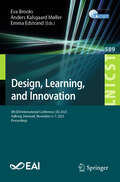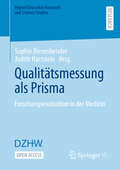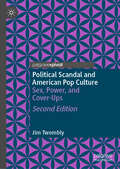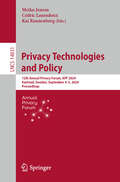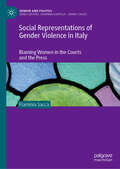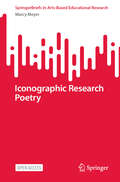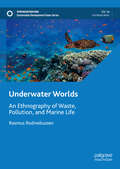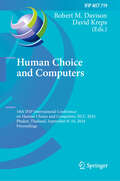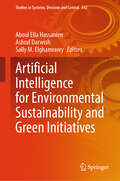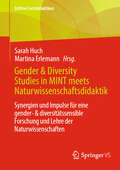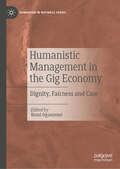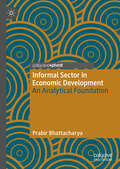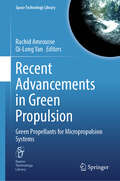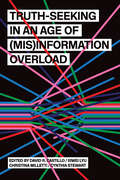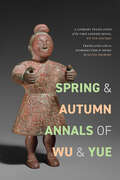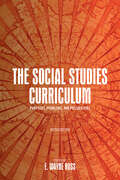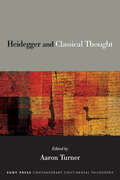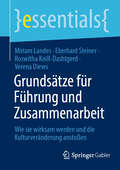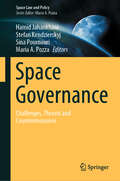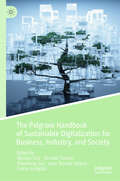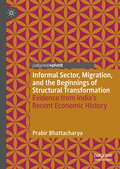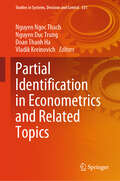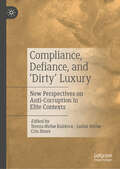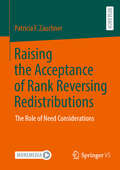- Table View
- List View
Design, Learning, and Innovation: 8th EAI International Conference, DLI 2023, Aalborg, Denmark, November 6–7, 2023, Proceedings (Lecture Notes of the Institute for Computer Sciences, Social Informatics and Telecommunications Engineering #589)
by Eva Brooks Anders Kalsgaard Møller Emma EdstrandThis book constitutes the refereed post-conference proceedings of the 8th EAI International Conference on Design, Learning, and Innovation, DLI 2023, held in Aalborg, Denmark, during November 6–7, 2023. The 16 full papers included in this book were carefully reviewed and selected from 48 submissions. They were organized in topical sections as follows: innovative approaches to enhancing education and student well-being; innovations in virtual reality (VR) and automated technologies for enhanced user experiences; exploring innovative approaches to learning and design; and innovative learning environments: collaborative approaches and emerging technologies.
Qualitätsmessung als Prisma: Forschungsevaluation in der Medizin (Higher Education Research and Science Studies)
by Sophie Biesenbender Judith HartsteinIn diesem Open-Access-Sammelband werden verschiedene Leistungsdimensionen und Datenzugänge für Abbildung medizinischer Forschung empirisch dargestellt und diskutiert. Leitfragen sind dabei:Wie identifizieren wir Qualität in der medizinischen Forschung?Unter welchen Bedingungen lassen sich medizinische Themen bestmöglich beforschen, um das Patientenwohl und die öffentliche Gesundheit zu fördern sowie Wissenschaft und Gesellschaft voranzubringen?Dieser Logik folgend startet der Sammelband mit Überblicksdarstellungen zum Stand der Evaluation medizinischer Forschung in Deutschland, führt dann auf die eher methodischen, informationswissenschaftlichen Aspekte und empirischen Perspektiven auf die Evaluation medizinischer Forschung und ergänzt diese mit soziologischen Aspekten zur Evaluation medizinischer Forschung als Steuerungsinstrument.
Political Scandal and American Pop Culture: Sex, Power, and Cover-Ups
by Jim TwomblyThis book provides a newer definition of political scandal and applies it in a way to remove “ordinary corruption” from the discussion. It then defines pop culture and examines how scandal and pop culture interact. The discussion addresses the question: when does a scandal actually enter into our pop culture. The mechanisms or vehicles by which this occurs include editorial cartoons, Broadway shows, music, movies, television, and more. The first chapter lays out the two main definitions and gives a bit of historical background to the discussion that follows. This new edition builds on the previous book with analysis of January 6th, George Santos, allegations of election fraud, and Rudy Giuliani. This book works well as a supplement in a course on American Government, in American Studies, and is aimed at a wide range of readers from college freshmen to more advanced scholars and political junkies.
Privacy Technologies and Policy: 12th Annual Privacy Forum, APF 2024, Karlstad, Sweden, September 4–5, 2024, Proceedings (Lecture Notes in Computer Science #14831)
by Kai Rannenberg Meiko Jensen Cédric LauradouxThis book constitutes the refereed proceedings of the 12th Annual Privacy Forum on Privacy Technologies and Policy, APF 2024, held in Karlstad, Sweden, during September 4–5, 2024. The 12 full papers were carefully reviewed and selected from 60 submissions. This conference was established as an opportunity to bring together key communities, namely policy, academia, and industry, in the broader area of privacy and data protection while focusing on privacy-related application areas. Like in the previous edition, a large focus of the 2024 conference was on the General Data Protection Regulation (GDPR) and the emerging legislation around the European Data Spaces and Arti cial Intelligence. Chapter 3, 9, 12 are licensed under the terms of the Creative Commons Attribution 4.0 International License (http://creativecommons.org/licenses/by/4.0/). For further details see license information in the chapter.
Social Representations of Gender Violence in Italy: Blaming Women in the Courts and the Press (Gender and Politics)
by Flaminia SaccàThis volume illustrates and analyses the stereotypes and prejudices underlying the social representation of violence against women as it is narrated and described in Italy by the press and by court judgements. After a theoretical reflection on the role of culture and socialisation in reproducing the conditions underlying gender-based violence and its normalisation, and after reconstructing the historical evolution of gender roles and the stages of women’s condition, the book presents the results of a sociological and of a socio-linguistic analysis on a vast corpus of 16,715 newspaper articles published by fifteen Italian newspapers on gender crimes (specifically: femicide; sexual violence; domestic violence; women trafficking) . The chapters analyze how national, macro-regional and local Italian press narrates violence against women but they also analyze a repertoire of 283 judicial sentences. The results show a clear tendency to redistribute the responsibilities of these crimes between the perpetrator and the victim, leading not only to secondary victimization but also to tertiary victimization, affecting the quality of Italian institutions as well as the democratic fiber of the nation. The volume finally includes a compendium of the best and the worst practices found in the corpuses of sentences and newspapers’ articles and a set of recommendations addressed to the institutional actors and journalists for a correct representation of gender-based violence, free from those stereotypes and prejudices that violate the dignity of male violence’ victims and prevent them from accessing justice.
Iconographic Research Poetry (SpringerBriefs in Arts-Based Educational Research)
by Marcy MeyerThis open access book introduces readers to the craft of writing iconographic research poetry in a way that is scholarly, yet playful. By tracing the historical foundations of concrete and iconographic poetry, as well as the development of research poetry and poetic inquiry, the book examines the intellectual roots that inform this unique methodological approach. The book offers a detailed description of the methods that can be used to design iconographic research poetry. It includes step-by-step description of strategies that researchers can use to create iconographic research poetry from qualitative data. By explicating the processes by which data can be represented in the form of iconographic research poetry and offering exemplars, readers will find specific hands-on strategies for creating their own iconographic research poems. The book contains writing exercises designed to help aspiring iconographic research poets exercise their poetic imagination. It also provides qualitative research instructors with suggestions for integrating iconographic research poetry into the classroom.
Underwater Worlds: An Ethnography of Waste, Pollution, and Marine Life (Sustainable Development Goals Series)
by Rasmus RodineliussenThis book investigates relations between humans, waste, pollution, and marine life. It introduces the concept of Aquabiopolitics as a means to understand how humans govern life in water in order to enrich human life on land. The study focuses on the Baltic Sea and Lake Mälaren, using Stockholm, the capital of Sweden, as the connection point. Throughout the book, the author explores how human practices over time have had devastating effects on marine life and continue to have so today. The book engages with the marine world through underwater ethnography to provide a perspective on water from below the surface. In this endeavor, it tracks marine scientists and trash scuba divers who are jointly invested in tracking human maltreatment of water and finding solutions for treating water differently in the future. It follows the scientists on expeditions at sea and to their laboratories in order to learn about their methods and relations to underwater worlds. Together with the trash scuba divers, we will dive into the dark murky waters around Stockholm—experiencing what it is like to move below water, among sharp and toxic waste, without any visibility. The work of creating a knowing and caring relationship between humans and water is of key importance to both scientists and divers. Therefore, one of the main parts of this book is to analyze how, and if, this relationship can be created: via social media, images, installations, or other means.
Human Choice and Computers: 16th IFIP International Conference on Human Choice and Computers, HCC 2024, Phuket, Thailand, September 8–10, 2024, Proceedings (IFIP Advances in Information and Communication Technology #719)
by David Kreps Robert M. DavisonThis book constitutes the refereed proceedings of the 16th IFIP International Conference on Human Choice and Computers, HCC 2024, held in Phuket, Thailand, during September 8–10, 2024. The 9 full papers presented in this book were carefully reviewed and selected from 17 submissions. Summaries of 2 keynote presentations are also included. This papers focus on Humans, Technological Innovations and Artificial Intelligence: Opportunities and Consequences.
Artificial Intelligence for Environmental Sustainability and Green Initiatives (Studies in Systems, Decision and Control #542)
by Ashraf Darwish Aboul Ella Hassanien Sally M. ElghamrawyThis book discusses AI's applications in sustainability, exploring its potential in sectors such as energy, healthcare, agriculture, transportation, and waste management. Discusses applications and innovations in Green Initiatives such as energy, finance, and drug discovery. Highlights the ethical challenges and benefits of integrating AI into sustainability initiatives
Gender & Diversity Studies in MINT meets Naturwissenschaftsdidaktik: Synergien und Impulse für eine gender- & diversitätssensible Forschung und Lehre der Naturwissenschaften (Edition Fachdidaktiken)
by Martina Erlemann Sarah HuchGender und dessen Zusammenwirken mit weiteren Diversity-Dimensionen wie etwa soziale Herkunft, ein (zugeschriebener) Migrationshintergrund oder sexuelle Orientierung stehen an Hochschulen verstärkt im Fokus. Gefordert sind dabei auch gender- und diversitysensible Ausrichtungen der Forschung und Lehre der MINT-Fächer sowie der hochschulischen Lehramtsausbildung für MINT. Welche inhaltliche Relevanz haben Gender- und Diversity-Aspekte in Fachkultur, Forschungsinhalten sowie im Wissenschaftsverständnis der Naturwissenschaften? Wie strukturieren Geschlecht und andere soziale Differenzkategorien die Forschung? Wie kann eine Gender- und Diversity-Kompetenzen vermittelnde Lehrer*innenbildung aussehen?Auf diese Fragen geben die interdisziplinären Beiträge der Wissenschaftler*innen, etwa aus Physik, Biologie, Medizin, Feminist Science & Technology Studies sowie die naturwissenschaftlichen Fachdidaktiken Antworten. Ansätze sowie Wissensbestände der Gender & Diversity Studies in MINT werden mit den gender- und diversityausgerichteten Naturwissenschaftsdidaktiken zusammengeführt. Mit vielfältigen Anregungen ermutigen sie zu einer gender- und diversityorientierten Ausrichtung der (eigenen) Forschung und Lehre.
Humanistic Management in the Gig Economy: Dignity, Fairness and Care (Humanism in Business Series)
by Kemi OgunyemiGig-workers are often not regarded as employees by the platforms they work with. Yet they do not always have all the freedoms enjoyed by independent contractors. The world of work is changing, and this is one area in which the new realities need to be better understood in order to promote human dignity, protect the vulnerable and foster flourishing. To achieve this, justice and fairness need to be researched and innovatively translated into new forms of work in diverse ways and in various cultures. This edited collection explores and examines ways in which the humanistic management and fairness considerations help to humanise the way gig-workers are treated, with particular attention paid to economies in the global south. Countries represented in the case study section are Brazil, Colombia, Ecuador, Kenya, Nigeria, South Korea, and Uganda, and both traditional and innovative lenses of fairness and ethics are applied to these new forms of work. The book will be of great interest to scholars and students of work and employment, digital business, human resource management and business ethics.
Informal Sector in Economic Development: An Analytical Foundation
by Prabir BhattacharyaThis book bridges the gap between theoretical and empirical understandings of the informal sector to provide insight into the role of the informal sector within the development process. By analysing three economic sectors, it sets out a framework for analysing urbanisation, rural-urban migration, agriculture- industry relationship, income inequality, structural change, employment, and optimal growth. Through highlighting the economic contribution of the informal sector, its impact on the national output and influence on the labour market is shown, alongside how employment opportunities in the informal sector drive rural and urban migration. This book presents a nuanced understanding of the dynamics of the informal sector and its role in the development of economies. It will be of interest to researchers and policymakers working within development economics and growth economics.
Recent Advancements in Green Propulsion: Green Propellants for Micropropulsion Systems (Space Technology Library #44)
by Rachid Amrousse Qi-Long YanThis book introduces recent developments in green propellants and green propulsion systems by various worldwide research groups. Various space agencies across the globe have accelerated the development of non-toxic green propellants, and the European Union is planning to phase out hydrazine (liquid) and ammonium perchlorate (solid) as propellants in the future, as it was identified as a substance of high concern by the REACh regulation.Although the process is still ongoing, it has triggered the development of attractive new propellants and technologies for the market, fostering research for non-toxic, high-performance alternative technologies. Several green propellants and green propulsion systems have been developed, tested, and even commercialized, such as ADN- or HAN-based propulsion, hydrogen peroxide propulsion, and water propulsion technology, where water is electrolyzed in orbit to O2 and H2, then combusted for the generation of thrust. This book describes proposed solutions to replace hydrazine, its derivatives and ammonium perchlorate with green propellants, discusses recent progress in environmentally friendly propellant systems and covers recent advancements on materials, catalysts and oxidizers for green solid rocket propellants. It aims to provide necessary technical information for space mission and propulsion systems' designers and researchers in this aerospace field.
Truth-Seeking in an Age of (SUNY series, Humanities to the Rescue)
by David R. Castillo, Siwei Lyu, Christina Milletti, and Cynthia StewartThe unprecedented spread of false and misleading information is the flip side of the Internet's promise of universal access and information democratization. This volume features original contributions from scholars working on the challenge of misinformation across a wide range of STEM, humanities, and art disciplines. Modeling a collaborative, multidisciplinary "convergence approach," Truth-Seeking in an Age of (Mis)Information Overload is structured in three parts. Part 1, "Misinformation and Artificial Intelligence," confronts the danger of outsourcing judgement and decision-making to AI instruments in key areas of public life, from the processing of loan applications to school funding, policing, and criminal sentencing. Part 2, "Science Communication," foregrounds the need to rethink how scientific findings are communicated to the public, calling on scientists to cooperate with colleagues in other disciplines and community representatives to help minimize the negative effects of mis/disinformation in such vital areas as climate change science and public health. Part 3, "Building Trust," further advocates for and explores instances of trust-building initiatives as a necessary precondition of both community-oriented scholarly activity and effective intervention strategies in high impact areas such as public health.
Spring and Autumn Annals of Wu and Yue: A Literary Translation of the First Chinese Novel, Wu Yue chunqiu (SUNY series, Translating China)
by Olivia Anna MilburnA Tale of Two Kingdoms offers a highly readable translation of the earliest surviving novel written in the Chinese language, Wu Yue chunqiu (The Spring and Autumn Annals of the Kingdoms of Wu and Yue). Composed nearly two millennia ago and featuring some of the most famous characters in Chinese literature, this powerful saga of humiliation, violence, and revenge recounts the battles between the states of Wu and Yue during the Spring and Autumn period (770–481 BCE). In her detailed introduction and annotations, translator Olivia Milburn places the work in its historical and cultural context and explains its ongoing significance in the history of fiction writing in East Asia, making the case that this was, in fact, China's first novel. This approachable translation by one of the leading scholars in the field makes this key text available to specialist and nonspecialist readers alike.
The Social Studies Curriculum, Fifth Edition: Purposes, Problems, and Possibilities
by E. Wayne RossThe Social Studies Curriculum, Fifth Edition updates the definitive overview of the issues teachers face when creating learning experiences for students in social studies. Renowned for connecting diverse elements of the social studies curriculum—from history to cultural studies to contemporary social issues—the book offers a unique and critical perspective that continues to separate it from other texts. The social studies curriculum is contested terrain both epistemologically and politically. Completely updated and revised, the fifth edition includes fourteen new chapters and covers the politics of the social studies curriculum, questions of historical perspective, Black education and critical race theory, whiteness and anti-racism, decolonial literacy and decolonizing the curriculum, gender and sexuality, Islamophobia, critical media literacy, evil in social studies, economics education, anarchism, children’s rights and Earth democracy, and citizenship education. Readers are encouraged to reconsider their assumptions and understandings of the purposes, nature, and possibilities of the social studies curriculum.
Heidegger and Classical Thought (SUNY series in Contemporary Continental Philosophy)
by Aaron TurnerDespite a sustained and fruitful relationship with the classical philologists of his day, Martin Heidegger's status among classicists has long since been strained, especially in the Anglophone tradition. Heidegger and Classical Thought reemphasizes both Heidegger's importance to classical discourse and the significance of classical discourse for Heidegger's own work. The essays found in this book demonstrate the depth and breadth of Heidegger's engagement with classical thought throughout his life, from his early engagements with Aristotle and Plato to his profound readings of the early Greek thinkers. At the same time, this book shows how reading Heidegger's interpretation of classical thought offers new and innovative ways to approach and study antiquity.
Kritische Analysen zur sogenannten "Clankriminalität": Phänomenologische Betrachtungen und Konstitution eines sozialen Problems
by Alexander WollingerIm gegenwärtigen Diskursfeld „Clankriminalität“ sind das Deutungsschema, die Begrifflichkeit selbst und die Behandlung des Phänomens durch Innenressorts, Strafverfolgungs- und andere Behörden umstritten. Es herrscht eine intensive Auseinandersetzung um Fragen, die sich zwischen Über- und Unterschätzung des Phänomens, zwischen selbst verursachter oder „importierter“ Kriminalität sowie zwischen Null-Toleranz-Reaktionen des Rechtsstaats einerseits und der Diskriminierung ganzer Bevölkerungsgruppen andererseits bewegen. Vereinfacht dargestellt, besteht ein Konflikt zwischen den antagonistischen Ideen „harter“ und das Phänomen negierender Deutungsschemata. Der Sammelband soll einen wissenschaftlich dominierten, differenzierten, bzw. „moderaten“ Weg einschlagen, ohne die o. g. Gegenpole zu ignorieren. Das Ziel ist die fundierte Schließung bisheriger Erkenntnislücken und die Korrektur diskursiv verbreiteter Annahmen. Das Buch adressiert ein interessiertes Fachpublikum aus den Kriminal- und Sozialwissenschaften sowie der mittleren und höheren Führungsebene der Polizei und sozialen Arbeit bzw. der Kriminalprävention.
Grundsätze für Führung und Zusammenarbeit: Wie sie wirksam werden und die Kulturveränderung anstoßen (essentials)
by Miriam Landes Eberhard Steiner Roswitha Knill-Dashtgerd Verena DiewsGrundsätze für Führung und Zusammenarbeit sind sinnvolle Instrumente der Unternehmenskultur-Entwicklung. Sie können Orientierung geben, die Arbeitgebermarke transportieren, Regeln der Kooperation festlegen und motivieren.
Space Governance: Challenges, Threats and Countermeasures (Space Law and Policy)
by Hamid Jahankhani Stefan Kendzierskyj Maria A. Pozza Sina PournouriThis book delves into the complexities of space governance, offering innovative solutions for a sustainable future. From the pressing issues facing space governance today to creating a consensus on responsibility, ethics, and frameworks, we aim to answer key questions: (i) What are the current challenges? (ii) How do satellites impact society? (iii) What are the potential negative consequences? From communication and early warning systems to global broadcasting and navigation, satellite technology plays a pivotal role in our daily lives. However, this reliance also exposes vulnerabilities, as any disruption to satellite systems could have disastrous consequences across multiple industries. The rapid development of satellite technology, including drones and UAVs, has ushered in a new era of exploration and exploitation. Yet, this progress brings with it new challenges, particularly in terms of governance. As satellites transcend national boundaries, the dynamics of space governance become increasingly complex, with various entities pursuing their own interests without always considering the broader implications. This book bridges the knowledge gap surrounding space technology and highlights the need for increased governance frameworks, data protection, and disciplined deployment. By addressing issues of control, privacy, and security, we pave the way for a more sustainable and responsible approach to space exploration. Join us on this journey as we navigate the evolving landscape of space governance and chart a course towards a brighter future for all.
The Palgrave Handbook of Sustainable Digitalization for Business, Industry, and Society
by Myriam Ertz Urvashi Tandon Shouheng Sun Joan Torrent-Sellens Emine SarigöllüThis handbook conceptualizes sustainable digitalization and discusses the role of digitalization in addressing business and societal challenges. Divided into eight sections, the book opens by an introductory chapter examining the theoretical foundations of the field. Part 1 explores the first dimension of sustainable digitalization, namely digitalization for sustainability (DFS) or how digitalization could address several of the sustainable development goals. Part 2 addresses the second dimension of sustainable digitalization. Titled responsible digital (RD), it covers the potential risks of increased digitalization and outlines strategies for governing digitalization for sustainable development to avoid the risks summarized earlier in the book. Tying digitalization to such topics as smart agriculture, industry 4.0, education, ecological transition, climate, clean water, food production, and social well-being, this handbook provides a framework for the emerging field of sustainable digitalization.
Informal Sector, Migration, and the Beginnings of Structural Transformation: Evidence from India’s Recent Economic History
by Prabir BhattacharyaThis book explores the role of the informal sector at the beginning of the structural transformation of the Indian economy. It highlights the dynamic nature of the informal sector and the crucial role that it played in that transformation. The growth of the informal sector is analysed alongside the decline in agriculture and the growth of industry. Issues such as unemployment, wages, rural-to-rural migration, in addition to rural-to-urban migration, are discussed. The book also considers the role of social factors, including those relating to caste and tribe, in migration decisions. It also highlights the links between migration, the informal sector, and economic growth that are also relevant to other developing countries. This book will be of interest to students and researchers in development economics, development studies, and economic history.
Partial Identification in Econometrics and Related Topics (Studies in Systems, Decision and Control #531)
by Vladik Kreinovich Nguyen Ngoc Thach Nguyen Duc Trung Doan Thanh HaThis book covers data processing techniques, with economic and financial application being the unifying theme. To make proper investments in economy, the authors need to have a good understanding of the future trends: how will demand change, how will prices change, etc. In general, in science, the usual way to make predictions is: to identify a model that best fits the current dynamics, and to use this model to predict the future behavior. In many practical situations—especially in economics—our past experiences are limited. As a result, the authors can only achieve a partial identification. It is therefore important to be able to make predictions based on such partially identified models—which is the main focus of this book. This book emphasizes partial identification techniques, but it also describes and uses other econometric techniques, ranging from more traditional statistical techniques to more innovative ones such as game-theoretic approach, interval techniques, and machine learning. Applications range from general analysis of GDP growth, stock market, and consumer prices to analysis of specific sectors of economics (credit and banking, energy, health, labor, tourism, international trade) to specific issues affecting economy such as ecology, national culture, government regulations, and the existence of shadow economy. This book shows what has been achieved, but even more important are remaining open problems. The authors hope that this book will: inspire practitioners to learn how to apply state-of-the-art techniques, especially techniques of optimal transport statistics, to economic and financial problems, andinspire researchers to further improve the existing techniques and to come up with new techniques for studying economic and financial phenomena. The authors want to thank all the authors for their contributions and all anonymous referees for their thorough analysis and helpful comments. The publication of this book—and organization of the conference at which these papers were presented—was supported: by the Ho Chi Minh University of Banking (HUB), Vietnam, and by the Vingroup Innovation Foundation (VINIF). The authors thank the leadership and staff of HUB and VINIF for providing crucial support.
Compliance, Defiance, and ‘Dirty’ Luxury: New Perspectives on Anti-Corruption in Elite Contexts
by Cris Shore Jardar Østbø Tereza Østbø KuldovaThis book interrogates the transnational field of (anti-)corruption and elite crime. Using the lens of luxury, art, and antiquities, the contributors reconceptualize the driving dialectics of corruption and anti-corruption. Compliance, Defiance and 'Dirty' Luxury brings together scholars across criminology, anthropology, sociology, and the humanities to tackle these dialectics from different angles and positions, digging deeper into these corrupt zigzags of compliance and defiance. This approach reveals a self-reinforcing, accelerating, neoliberal perpetuum mobile churning out a frenzy of public-private crime-fighting initiatives that stimulate the expansion of various control and surveillance architectures which time and again fail. This volume opens new theoretical and empirical paths of investigation for criminologists and anthropologists alike. While the book speaks primarily to academic audiences and graduate students, it also appeals to a broad range of professionals. Tereza Østbø Kuldova is Research Professor and a social anthropologist based at the Work Research Institute, Oslo Metropolitan University, Norway. Jardar Østbø is Professor and Head of Programme for Russian Security and Defence Policy at the Institute for Defence Studies, Norwegian Defence University College. Cris Shore is emeritus Professor of Anthropology at Goldsmiths University of London, UK, and currently Senior Research Fellow at the Institute for Advanced Study, Central European University, Hungary.
Raising the Acceptance of Rank Reversing Redistributions: The Role of Need Considerations
by Patricia F. ZauchnerRedistribution is a major objective of welfare states. In certain cases, redistribution not only reduces the financial differences between some individuals or groups but also changes their positions in a financial ranking. Prior studies have indicated that such rank reversals can reduce support for redistribution. This book addresses this issue by arguing that if redistribution is aimed at meeting needs rather than promoting equality, the negative effect of rank reversals on the acceptance of redistribution can be reduced. The argument is first supported by a theoretical exploration, which, among others, endeavors to incorporate a no-reranking principle into the well-established list of distributive justice principles. It shows that although individuals may apply the no-reranking principle, the principle is normatively weak, especially compared to the need principle. The argument is further supported by evidence from an online third-party dictator game in which each decision-maker had to redistribute money between two other participants. It varied whether those participants were above or below a specific needs threshold and whether a transfer would reverse ranks or not. The results showed that when redistribution was required to satisfy the poorer person’s needs, the negative effect of rank reversals on the acceptance of redistribution almost vanished.
